Bishop Surname Ancestry ResultsOur indexes 1000-1999 include entries for the spelling 'bishop'. In the period you have requested, we have the following 2195 records (displaying 1641 to 1650): Single Surname Subscription | | | Buying all 2,195 results of this search individually would cost £12,948.00. But you can have free access to all 2,195 records for a year, to view, to save and print, for £100. Save £12,848.00. More... |
These sample scans are from the original record. You will get scans of the full pages or articles where the surname you searched for has been found. Your web browser may prevent the sample windows from opening; in this case please change your browser settings to allow pop-up windows from this site. Trainee Schoolmistresses in Scotland
(1878)
The Education Department set examinations for candidates for admission into training colleges, and for the office of teacher. This is the list of successful female candidates from Scotland at the examination at Midsummer 1878. The number in the first column shows order of merit in each class in the examination; then there is the name of the candidate (surname, christian name and any intermediate initial(s)), the school in which engaged, and the training college at which examined. The names of pupil teachers are shown in italics, with the 'school in which engaged' column left blank. These abbreviations are used in the names of schools: C. of S., Church of Scotland; Epis., Episcopal; F. C., Free Church; G. A., General Assembly (Church of Scotland); P., Parochial; Pub., Public; R. C., Roman Catholic; Sessl., Sessional; Undl., Undenominational.BISHOP. Cost: £6.00.  | Sample scan, click to enlarge
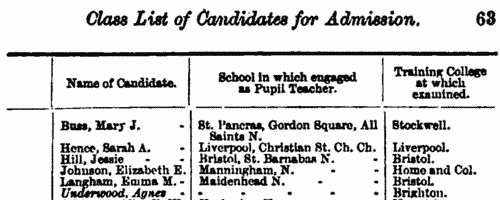
|  Men of the 17th Lancers (The Duke of Cambridge's Own) fighting in South Africa
(1877-1879) Men of the 17th Lancers (The Duke of Cambridge's Own) fighting in South Africa
(1877-1879)
What is commonly called the Zulu War Medal was awarded to those British soldiers who fought in a series of conflicts in southern Africa from 1877 (the Kaffir War) through to 1879 (the Zulu War). In 1880 the various units submitted returns of the officers, non-commissioned officers and men 'entitled to the Medal for Military Operations in South Africa during 1877-8-9' and these 'medal rolls' are now in the National Archives. The returns are made with the information arranged in twelve columns:
1. Rank and name
2. Regimental number and rank at the time the medal was earned
3. Whether in possession of medal for previous wars
4. Whether engaged against the Gaikas, Galekas and other Kaffir tribes 1877-8
5. Whether engaged against Pokwane 1878
6. Whether engaged against the Griquas 1878
7. Whether engaged against the Zulus 1879
8. Whether engaged against Sekukuni as set forth in Par. 2. G. O.
9. Whether engaged against Moirosi's stronghold
10. Entitled to medal without clasp under Par. 4.
11. Serving with regiment, depot, dead, discharged, deserted, &c.
12. Notes and cross-references to the Adjutant-General's medal lists.
WO 100/46.
BISHOP. Cost: £8.00.  | Sample scan, click to enlarge
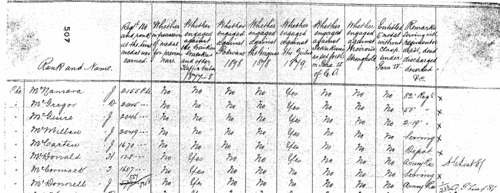
|  Men of the 1st (The King's) Dragoon Guards (including the 12th Lancers) fighting in South Africa
(1877-1879) Men of the 1st (The King's) Dragoon Guards (including the 12th Lancers) fighting in South Africa
(1877-1879)
What is commonly called the Zulu War Medal was awarded to those British soldiers who fought in a series of conflicts in southern Africa from 1877 (the Kaffir War) through to 1879 (the Zulu War). In 1880 the various units submitted returns of the officers, non-commissioned officers and men 'entitled to the Medal for Military Operations in South Africa during 1877-8-9' and these 'medal rolls' are now in the National Archives. The returns are made with the information arranged in twelve columns:
1. Rank and name
2. Regimental number and rank at the time the medal was earned
3. Whether in possession of medal for previous wars
4. Whether engaged against the Gaikas, Galekas and other Kaffir tribes 1877-8
5. Whether engaged against Pokwane 1878
6. Whether engaged against the Griquas 1878
7. Whether engaged against the Zulus 1879
8. Whether engaged against Sekukuni as set forth in Par. 2. G. O.
9. Whether engaged against Moirosi's stronghold
10. Entitled to medal without clasp under Par. 4.
11. Serving with regiment, depot, dead, discharged, deserted, &c.
12. Notes and cross-references to the Adjutant-General's medal lists.
WO 100/46.
BISHOP. Cost: £8.00.  | Sample scan, click to enlarge
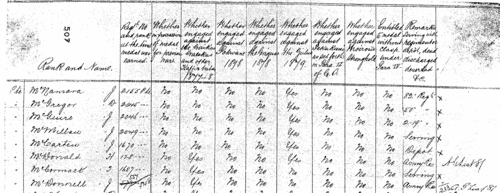
|  Men of the 21st Regiment of Foot (Royal Scots Fusiliers) fighting in South Africa
(1877-1879) Men of the 21st Regiment of Foot (Royal Scots Fusiliers) fighting in South Africa
(1877-1879)
What is commonly called the Zulu War Medal was awarded to those British soldiers who fought in a series of conflicts in southern Africa from 1877 (the Kaffir War) through to 1879 (the Zulu War). In 1880 the various units submitted returns of the officers, non-commissioned officers and men 'entitled to the Medal for Military Operations in South Africa during 1877-8-9' and these 'medal rolls' are now in the National Archives. The returns are made with the information arranged in twelve columns:
1. Rank and name
2. Regimental number and rank at the time the medal was earned
3. Whether in possession of medal for previous wars
4. Whether engaged against the Gaikas, Galekas and other Kaffir tribes 1877-8
5. Whether engaged against Pokwane 1878
6. Whether engaged against the Griquas 1878
7. Whether engaged against the Zulus 1879
8. Whether engaged against Sekukuni as set forth in Par. 2. G. O.
9. Whether engaged against Moirosi's stronghold
10. Entitled to medal without clasp under Par. 4.
11. Serving with regiment, depot, dead, discharged, deserted, &c.
12. Notes and cross-references to the Adjutant-General's medal lists.
WO 100/46.
BISHOP. Cost: £8.00.  | Sample scan, click to enlarge
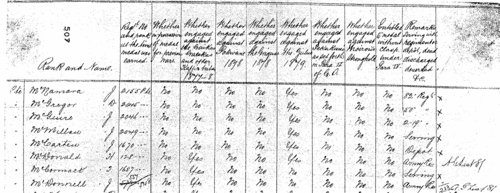
|  Men of the 24th Regiment of Foot (2nd Warwickshire) fighting in South Africa
(1877-1879) Men of the 24th Regiment of Foot (2nd Warwickshire) fighting in South Africa
(1877-1879)
What is commonly called the Zulu War Medal was awarded to those British soldiers who fought in a series of conflicts in southern Africa from 1877 (the Kaffir War) through to 1879 (the Zulu War). In 1880 the various units submitted returns of the officers, non-commissioned officers and men 'entitled to the Medal for Military Operations in South Africa during 1877-8-9' and these 'medal rolls' are now in the National Archives. The returns are made with the information arranged in twelve columns:
1. Rank and name
2. Regimental number and rank at the time the medal was earned
3. Whether in possession of medal for previous wars
4. Whether engaged against the Gaikas, Galekas and other Kaffir tribes 1877-8
5. Whether engaged against Pokwane 1878
6. Whether engaged against the Griquas 1878
7. Whether engaged against the Zulus 1879
8. Whether engaged against Sekukuni as set forth in Par. 2. G. O.
9. Whether engaged against Moirosi's stronghold
10. Entitled to medal without clasp under Par. 4.
11. Serving with regiment, depot, dead, discharged, deserted, &c.
12. Notes and cross-references to the Adjutant-General's medal lists.
WO 100/46.
BISHOP. Cost: £8.00.  | Sample scan, click to enlarge
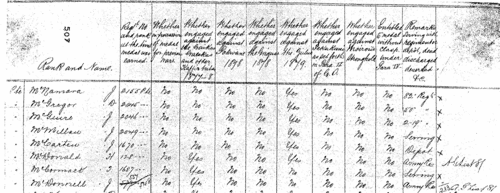
|  Men of the 4th Regiment of Foot (The King's Own Royal) fighting in South Africa
(1877-1879) Men of the 4th Regiment of Foot (The King's Own Royal) fighting in South Africa
(1877-1879)
What is commonly called the Zulu War Medal was awarded to those British soldiers who fought in a series of conflicts in southern Africa from 1877 (the Kaffir War) through to 1879 (the Zulu War). In 1880 the various units submitted returns of the officers, non-commissioned officers and men 'entitled to the Medal for Military Operations in South Africa during 1877-8-9' and these 'medal rolls' are now in the National Archives. The returns are made with the information arranged in twelve columns:
1. Rank and name
2. Regimental number and rank at the time the medal was earned
3. Whether in possession of medal for previous wars
4. Whether engaged against the Gaikas, Galekas and other Kaffir tribes 1877-8
5. Whether engaged against Pokwane 1878
6. Whether engaged against the Griquas 1878
7. Whether engaged against the Zulus 1879
8. Whether engaged against Sekukuni as set forth in Par. 2. G. O.
9. Whether engaged against Moirosi's stronghold
10. Entitled to medal without clasp under Par. 4.
11. Serving with regiment, depot, dead, discharged, deserted, &c.
12. Notes and cross-references to the Adjutant-General's medal lists.
WO 100/46.
BISHOP. Cost: £8.00.  | Sample scan, click to enlarge
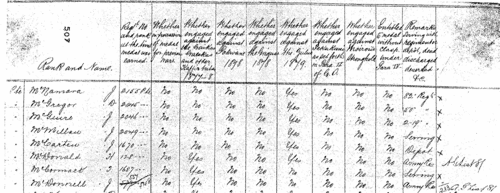
|  Men of the Royal Artillery fighting in South Africa
(1877-1879) Men of the Royal Artillery fighting in South Africa
(1877-1879)
What is commonly called the Zulu War Medal was awarded to those British soldiers who fought in a series of conflicts in southern Africa from 1877 (the Kaffir War) through to 1879 (the Zulu War). In 1880 the various units submitted returns of the officers, non-commissioned officers and men 'entitled to the Medal for Military Operations in South Africa during 1877-8-9' and these 'medal rolls' are now in the National Archives. The returns are made with the information arranged in twelve columns:
1. Rank and name
2. Regimental number and rank at the time the medal was earned
3. Whether in possession of medal for previous wars
4. Whether engaged against the Gaikas, Galekas and other Kaffir tribes 1877-8
5. Whether engaged against Pokwane 1878
6. Whether engaged against the Griquas 1878
7. Whether engaged against the Zulus 1879
8. Whether engaged against Sekukuni as set forth in Par. 2. G. O.
9. Whether engaged against Moirosi's stronghold
10. Entitled to medal without clasp under Par. 4.
11. Serving with regiment, depot, dead, discharged, deserted, &c.
12. Notes and cross-references to the Adjutant-General's medal lists.
WO 100/46.
BISHOP. Cost: £8.00.  | Sample scan, click to enlarge
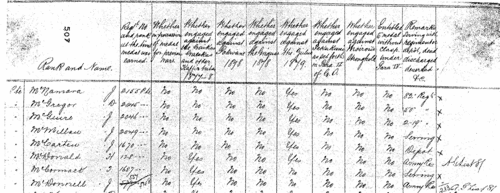
| Boys entering Gresham's School
(1879)
The Sir John Gresham Grammar School at Holt in Norfolk was founded by sir John, who bought the manor house there in 1546 to convert it into a school, and building work had started by 1555. To celebrate the quatercentenary in 1955, a history of the school written by the Reverend C. L. S. Linnell was published, together with an Alumni Greshamienses, a register of boys entering the school from 1562 to 1954, compiled by A. B. Douglas. The materials to hand for the register for the early years were slight; the first coherent lists of boys survive only from 1729, and then are fitful, with little detail, and largely missing from 1784 to 1803; however, from 1810 onwards the names of boys' parents are usually recorded. The register is arranged chronologically by year (and from 1900 by term - L, Lent; M, Michaelmas; S, Summer), and then alphabetically by surname (in capitals) and christian name(s). Where known, year of birth is then given (in brackets), names, addresses and occupations of parents. From 1900 onwards there are italic abbreviations for sporting achievements at school (h, hockey colours; VIII, shooting colours; S, first-class swimmer; XI, cricket colours; XV, football colours), and p for house prefect and P for school prefect; then (in italics) information about the boy's adult life, and his address (where living) at the time of publication. Finally, on the right hand side of the page, in italics, is given the year of his leaving the school. Most detail is absent before 1810; and, of course, for the boys still at school in 1955, or only recently left, there are no details of future career; nor are there the usual details about their parentage. From 1898 onwards day boys are noted with an italic D (N means Newquay dayboy); and from 1900 onwards the school houses are shown (B, Bengal Lodge; F, Farfield; H, School House or Howson's; K, Kenwyn; O, Old School House; W, Woodlands); and, for the junior school, c, Crossways; k, Kenwyn; o, Old School House).BISHOP. Cost: £4.00.  | Sample scan, click to enlarge
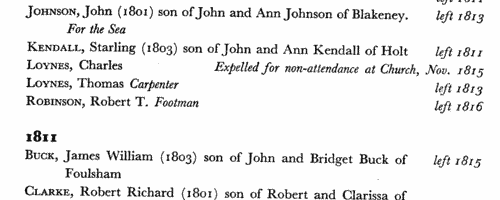
|  Zulu War Medal Roll: 57th (West Middlesex) Regiment of Foot
(1879) Zulu War Medal Roll: 57th (West Middlesex) Regiment of Foot
(1879)
List of Officers, Non Commissioned Officers, and men, entitled to the medal for military operations in South Africa, during 1877-8-9, and the names of those soldiers who would have been entitled except for Desertion, or Misconduct. The thirteen columns of the return give these details:
[Rank:]
[Name:]
[Regtl. No. and Rank at the time Medal was earned:]
[Whether in possession of medal for Previous Wars:]
[Whether engaged against the Gaikas, Galekas and other Kaffir tribes 1877-8:]
[Whether engaged against Pokwane 1878:]
[Whether engaged against the Griquas 1878:]
[Whether engaged against the Zulus in 1879:]
[Whether engaged against Sekukuni as set forth in Par II of G. O.:]
[Whether engaged against Moirosiís stronghold:]
[Entitled to Medal with clasp under Para. IV:]
[Remarks Serving with Regiment or depot dead discharged deserted &c:]
[An empty column for notes]
This regiment's actions were almost exclusively against the Zulus in 1879. WO 100/47
BISHOP. Cost: £6.00.  | Sample scan, click to enlarge

| Bankrupts, Assignees, Trustees and Solicitors
(1880)
Bankruptcy notices in England and Wales, April to June 1880BISHOP. Cost: £6.00.  | Sample scan, click to enlarge

|
Research your ancestry, family history, genealogy and one-name study by direct access to original records and archives indexed by surname.
|













